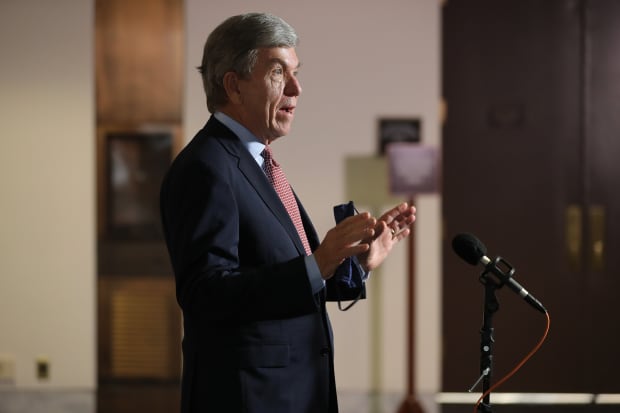This post was originally published on this site

Sen. Roy Blunt, R-Mo., talks to journalists as he arrives for a Republican Senate luncheon on Capitol Hill Sept. 16. (Getty Images)
If the 116th Congress was a baseball game, it would be in the ninth inning and efforts to reach a deal on a second large package to deal with the pandemic’s cost to the U.S. economy would be down to their last strike.
After collaborating on a series of measures in the spring, the cost of which congressional scorekeepers put at almost $3 trillion over two years, Democrats and Republicans have been unable to reach another big deal.
Lawmakers are set to leave Washington late next week, deal done or not, to hit the campaign trail through the Nov. 3 Election Day, leaving a very narrow window in which to try to work something out.
Sen. Roy Blunt, the Missouri Republican who served in House leadership before becoming a senator as part of his 23-year congressional career, was not optimistic. “There needs to be some developments there and I just don’t know. I was much more optimistic this time last Thursday than I am now,” he said Thursday.
“But we need to do something. The elements are there to get it done but it could be there’s just not enough oxygen left in the room to get that done,” he said.
The looming fight over the replacement for Ruth Bader Ginsburg is the main thing that will take up some of that lawmaker bandwidth, at least in the Senate. Also, the first presidential debate Tuesday night will take up some attention.
Read more: When is the first Trump and Biden debate?
But the schedule will also play a role.
Both chambers will be out of session Monday in observance of Yom Kippur and first votes, the starting gun for the legislative workweek , won’t be until late Tuesday. The House is scheduled to be in session through Friday, while the Senate is expected to be in only through Thursday, as is its custom.
On the other hand, one major headache will be gone: the threat of government shutdown. The House passed a stopgap funding bill to keep the government’s lights on through Dec. 11 on a 359-57 vote. It also made it through a Senate procedural vote handily and will likely be cleared for President Donald Trump’s signature Wednesday.
One prod to get a deal done: the economic boost provided by the $1.7 trillion CARES Act in March is running out. Airlines have threatened to make mass layoffs in October unless they get renewed aid in addition to the $32 billion provided in CARES. A workaround fix by the Trump administration for the lapse of the $600 add-on jobless benefit payment is also ending, cutting the incomes of many unemployed.
Finally, the House, in what Democrats describe as a bid to restart long-stalled talks with the White House, may vote on a trimmed back version of its initial offer, a $2 trillion-plus bill that would include the unemployment add-ons, checks to households, a revival of the Paycheck Protection Program for small businesses and aid for airlines and restaurants.
Read more: Democrats prep new bill as gambit to get stimulus efforts unstuck
A spokesman for Pelosi said Friday there were no updates when asked if she and Treasury Secretary Steven Mnuchin, one of two Trump negotiators, had spoken yet to renew talks.
Rep. Kevin Brady, the top Republican member of the House Ways and Means Committee, said the new bill was a waste of time, though, because Pelosi did not want a deal.
“She could pass 10 more partisan bills. That won’t get us closer to helping these small businesses. Just another wasted exercise,” Brady said Thursday.
Pelosi at her weekly press conference said she hoped to sit down soon with White House negotiators. “Now that the CR’s done, we hope that the Administration will come forward with the resources to meet the needs of the American people,” she said.
“We came down a trillion dollars in our $3.4 trillion bill, then we offered to meet the Republicans halfway. We still haven’t heard back about that.”
The White House has said it could go as high as $1.3 trillion for a package, but at least a few Senate Republicans would have trouble swallowing that. Still, some held out hope there was enough in common to make a deal.
Sen. John Thune, the second-ranking Senate Republican, said Thursday he thinks the elements of a deal exist in the Paycheck Protection Program, airline aid and the unemployment benefits add-on but Democrats appeared to be dug in on wanting a bigger package.
“You know, my view is just because we can’t do everything doesn’t mean we shouldn’t do something. And right now people are hurting and there are a number of things on which we agree,” he said.
“But we’ll find out next week whether there’s any — what the traffic will bear in terms of moving forward.”

